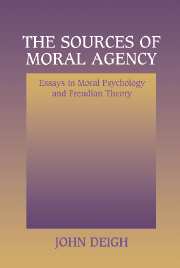Book contents
- Frontmatter
- Contents
- Preface
- Sources
- Abbreviations
- Dedication
- 1 Morality and personal relations
- 2 On the right to be punished: Some doubts
- 3 Love, guilt, and the sense of justice
- 4 Remarks on some difficulties in Freud's theory of moral development
- 5 Freud's later theory of civilization: Changes and implications
- 6 Freud, naturalism, and modern moral philosophy
- 7 Reason and motivation
- 8 Empathy and universalizability
- 9 Sidgwick on ethical judgment
- 10 Reason and ethics in Hobbes's Leviathan
- 11 Shame and self-esteem: A critique
- Index
7 - Reason and motivation
Published online by Cambridge University Press: 04 December 2009
- Frontmatter
- Contents
- Preface
- Sources
- Abbreviations
- Dedication
- 1 Morality and personal relations
- 2 On the right to be punished: Some doubts
- 3 Love, guilt, and the sense of justice
- 4 Remarks on some difficulties in Freud's theory of moral development
- 5 Freud's later theory of civilization: Changes and implications
- 6 Freud, naturalism, and modern moral philosophy
- 7 Reason and motivation
- 8 Empathy and universalizability
- 9 Sidgwick on ethical judgment
- 10 Reason and ethics in Hobbes's Leviathan
- 11 Shame and self-esteem: A critique
- Index
Summary
Descartes, near the beginning of the Meditations, raised and then immediately dismissed the possibility that he was mad. He had embarked on an investigation into the power of reason to discover truths that by virtue of their being indubitable could constitute the foundations of scientific knowledge, and since his plan of investigation was to test his own reasoning powers, taking them to be exemplary, he had to assume that he had a rational mind. Thus he dismissed out of hand the possibility of his being mad. Nonetheless, he took it to suggest another: he might be dreaming. For the thoughts one has while dreaming can be as fantastic and incoherent as the thoughts madmen have in their waking lives. What is more, dreaming is consistent with possessing a rational mind. It is a state to which, as far as Descartes could tell, everyone is liable when asleep. That he might be dreaming was therefore a possibility Descartes could not immediately dismiss. It was a proper object of inquiry, and as long as it remained open, he could make no claim sustainable by reason to having knowledge of particular states and events of the physical world.
Although Descartes's investigation concerned the power of theoretical reason, his way of proceeding can serve as an object lesson for those investigating the power of practical reason.
- Type
- Chapter
- Information
- The Sources of Moral AgencyEssays in Moral Psychology and Freudian Theory, pp. 133 - 159Publisher: Cambridge University PressPrint publication year: 1996



